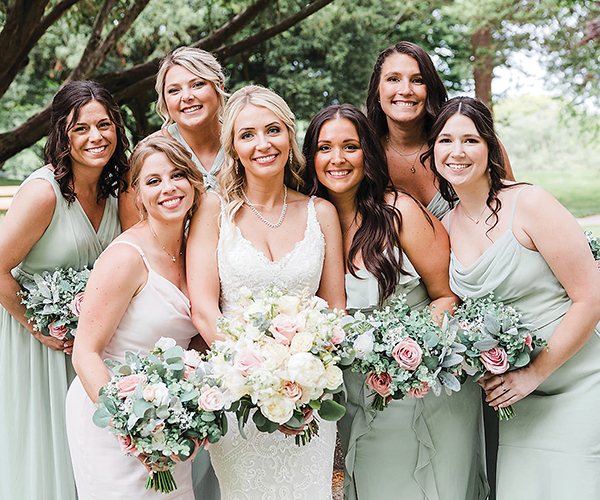When couples walk down the aisle to say, “I do,” they take it for granted that they will become one of those elderly couples who still hold hands and snuggle at the movies. Sure, there will be problems to solve and challenges to meet, they think. But in the end, their love will certainly prevail.
Sadly, many of them are wrong. According to the National Center for Health Statistics in Hyattsville, Md., 51 percent of all marriages in the United States end in divorce.
Why do some marriages endure and others don’t? There is no single formula for success. “Every marriage is different, and every marriage evolves,” explains Stephen B. Levine, M.D., clinical professor of psychiatry at Case Western Reserve University in Cleveland and co-director of the Center for Marital and Sexual Health in Beachwood. “What is true about the marriage at Week 1 is not true at Week 7 or Year 7 or Year 17. Spouses are maturing as individuals and coping with all sorts of individual and joint life demands.” But experts agree that loving, lasting unions share certain elements. Love, contrary to the old Beatles song, isn’t all you need.
Couples start to lay the foundation for a sound marriage during courtship, says Levine. He observes that people who reach the finish line in the marital derby generally have chosen spouses who share their basic values and are comparable in education, earning power, etc. “For love to continue to grow, there has to be a respect for the way a person operates in the world,” he says. Ideally, couples start discussing their feelings about and expectations of one another regarding major issues — practicing religion, rearing children, women working outside the home (especially after having children), household division of labor, sexual intimacy — as soon as they know their relationship is getting serious, according to Victoria Stavlas, a licensed professional clinical counselor at Parma Community General Hospital. In successful marriages, the discussions continue throughout the relationship. She singles out the issue of sex as an example.
“Some people might feel that you have to have sex every single day or [the relationship] isn’t a good marriage,” Stavlas says. “And some people think having sex once a week [constitutes] a good marriage. It’s different for everybody.”
Michael McKee, Ph.D., vice chairman of the Cleveland Clinic Foundation’s Department of Psychiatry and Psychology, adds that well-matched couples have common “major needs” for togetherness, security, adventure, knowledge, etc. “If one person has major needs for love, security and affiliation, and the other person has major needs for achievement, power and money, you may have a hard time making it work together,” he says. However, he lists the three most important elements of a happy marriage as commitment, psychological intimacy and passion.
“To stand upright, you need all three legs,” he says. “Two don’t work — they’re wobbly.”
Commitment, of course, is what sets marriage apart from whatever romantic relationships the bride and groom may have had in the past. “You’re not just trying this out,” McKee says. “You’re really in to make it work.”
Levine defines psychological intimacy as “the ability to talk about one’s inner experiences and be listened to respectfully, with (nonjudgmental) comprehension.” According to McKee, it is psychological intimacy that differentiates the smiling couples in successive anniversary photos from the dour duo in Grant Wood’s famous 1930 painting, “American Gothic” — “standing there stern and fast together, no matter what.” “When you interview couples who have been together in long-term happy marriages, the thing they say first is, ‘We’re best friends.’ ” To maintain that friendship — and, in turn, commitment — the first thing McKee recommends is to keep talking to one another.
Indeed, communication is so important to maintaining a healthy, happy marriage that it’s the first thing Stavlas mentions. It is communication, after all, that allows people to explore whether they share the values to which Levine refers, to convey their feelings on major marital issues, as well as their expectations of a spouse. And it is essential to resolving conflict. McKee notes that it’s not whether couples fight, but how they fight, that determines whether they have lasting, satisfying unions.
“People who stay together inevitably run into conflict, just like the people who don’t stay together,” Levine observes. “But they’re much more skillful and accommodating to the resolution of this conflict.”
Levine stresses that a continuing respect for one another’s opinions is crucial when resolving conflict, as is a certain willingness to change one’s opinion after considering a spouse’s thoughts and feelings on the matter. “Many people are very sure they are right,” he explains. “They can’t allow themselves to modify their opinion based upon their partner’s opinion.” He cites the man who believes he is right simply because he is a man as a classic example.
Levine also notes that couples who stay together have learned what not to do during fights. They don’t bring up issues that have nothing to do with the topic at hand — for example, they don’t begin listing a mother-in-law’s flaws while they’re debating whether to send a child to daycare — and they don’t say things for the sole purpose of hurting their partner. They also strictly adhere to his two rules of communicating anger.
“You never speak of divorce, separation or abandonment until you really mean it,” he says, “and you never call your partner names.”
Stavlas says a happily married couple has also mastered the art of conveying emotions during conflict without immediately putting each other on the defense — or, for that matter, hurting themselves or someone else. Instead of beginning every sentence with an accusatory “you” that prepares the listener to issue a denial even before he or she has heard the entire thought, she suggests using the following sentence model: I feel (emotion) when you (action) because (reason). “If you say you feel a certain way, people can’t take that away from you,” she explains. “It’s your own. And you’re allowed to say how you feel.”
They’re also good listeners who not only hear what their spouse says but pick up on nonverbal cues and feelings. “You’re not just listening to their messages,” Staylas says. “You’re also trying to put yourself in their spot. And you’re letting them know that as you’re talking to them, they are the only thing in the world that you’re concentrating on right now.”
Stavlas concludes that couples who rack up the anniversaries are not only able to discuss a problem but actually solve it — that is, they are able to define the problem and their feelings about it and come up with a solution that is acceptable to both husband and wife. “If what you try to do doesn’t help, then you’ve got to look at other options,” she says. “That’s when two heads are always better than one.”
According to McKee, couples who stay together typically have come up with a way to make up fairly soon after a fight. “Sometimes it’s a look or a touch,” he says. “Sometimes it’s saying, ‘Hey, there’s something interesting in the paper!’ or ‘Do do you want to go for a cup of coffee?’ If you don’t have it, then you’re in trouble.” He points out that many spouses have simply learned to accept the minor flaws in their better half — she won’t take the time to put the cap back on the toothpaste, for example, or he can’t remember to lower the toilet seat — instead of trying to correct them.
“They ignore the small stuff,” he says.
Other ways to maintain or increase those warm, fuzzy feelings associated with psychological intimacy include simple but often-overlooked opportunities, such as saying “please” and “thank you;” writing love letters to one another; calling one another during the day just to check in; sharing an interesting newspaper story over morning coffee or while reading in bed; and complimenting one another. McKee suggests husbands and wives try to catch their spouse doing something right instead of doing something wrong. “The compliments-to-criticism ratio needs to be at least 5 to 1,” he says. To those who balk at the idea of slipping mushy notes in a spouse’s briefcase or picking up the cell phone just to say, “I love you,” Levine offers an incentive.
“Psychological intimacy,” he says, “enables people to get comfortable with sexual expression. Inside or outside of marriage, it paves the way, makes people feel comfortable with taking off their clothes.”
McKee’s definition of passion extends beyond a couple’s sexual desire for one another to include a shared zest for life — “There are lots of things you like do to together,” he explains. Unfortunately, the time for both sex and recreational activities often dwindles over the years as responsibilities at home, work, school, etc. increase. “The marriage gets put on the back burner on the assumption that it’ll always be there,” McKee says. “You’ve got to schedule in time for the marriage.” That means making dates to go out to dinner, take in a movie or an exhibit at the local art museum, even make love.
“If you don’t have sex, you’d better share passions of some other kind,” McKee warns, “or you’re going to have a pretty lukewarm marriage. Not that lukewarm marriages don’t survive. But it’s hard to label them as really happy and joyous.”
While newlyweds look forward to a life filled with joy and laughter, they will inevitably encounter their fair share of challenges, even tragedies. McKee says the couples who manage to weather the worst storms “neither blame nor deny.” For example, if financial circumstances dictate that a wife’s meddlesome mother move in with her and her spouse while recuperating from a serious illness, the husband doesn’t blame the wife for the situation, and the wife doesn’t deny that the situation is a difficult one.
“It’s when you turn on one another that it gets hard,” McKee says.
On the other hand, there are those couples who are fortunate enough to never face losing a child, caring for a sick relative or being downsized out of a job. When it comes to staying together until “death do us part,” Levine says couples “need a lot of good luck.”



